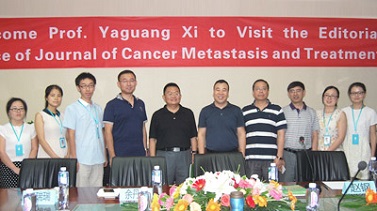Prof. Pier Paolo Piccaluga: Bridging Molecular Insights and Clinical Practice in Hematologic Malignancies
On August 8, 2025, Journal of Cancer Metastasis and Treatment (JCMT) had the honor of interviewing Prof. Pier Paolo Piccaluga, an internationally recognized expert in molecular oncology and hematologic malignancies and a long-standing Editorial Board member of JCMT. In this conversation, Prof. Piccaluga shared his latest research insights, perspectives on translational medicine, and advice for the next generation of researchers.
About Prof. Pier Paolo Piccaluga

Prof. Pier Paolo Piccaluga is a Professor of Pathology at the University of Bologna, Italy. His research focuses on the molecular pathogenesis of acute myeloid leukemia, lymphomas, and other blood cancers. By applying genomic and transcriptomic analyses, his group seeks to identify diagnostic biomarkers and novel therapeutic targets. He has authored numerous high-impact publications and made significant contributions to advancing precision medicine.
Interview Themes:
The interview covered three main themes:
1. Research Highlights and Motivation - Prof. Piccaluga reflected on what excites him most about his current work and what sustains his long-term dedication to understanding hematologic malignancies.
2. Translational Research and Innovation - He discussed barriers to successful translational research and the potential of AI, multi-omics, and single-cell technologies to reshape leukemia studies.
3. Advice for the Next Generation - Drawing on his experience as both scientist and mentor, he shared principles and values that young researchers should uphold to become future leaders in academic medicine.
Key Insights from the Interview
Prof. Piccaluga emphasized several key points:
- His laboratory applies high-throughput genomic and transcriptomic analyses to uncover abnormal genes and regulatory networks, translating them into precise diagnostics and therapeutic opportunities.
- The main challenge in translational medicine lies not in technology, but in bridging laboratory discoveries with clinical trials.
- Artificial intelligence (AI) and multi-omics approaches are becoming essential for improving trial design, identifying resistance mechanisms, and advancing precision medicine.
- For young scientists, mastering data analysis and AI tools, while maintaining innovative thinking, will be critical to driving future discoveries.
Shaping the Future of Precision Oncology
Prof. Piccaluga emphasized that successful translational research requires close integration of basic science and clinical trials, with biological assessments guiding treatment decisions. Looking ahead, he believes the next generation of researchers should unite experimental science with advanced computational analysis to drive innovation and advance precision oncology.
Watch the Full Interview
Editor: Frida Zhai
Language Editor: Catherine Yang
Production Editor: Ting Xu
Respectfully Submitted by the Editorial Office of Journal of Cancer Metastasis and Treatment









